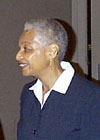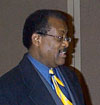- Categories:
African-American Programming at BEA
This year’s African-American programming provided both a larger business vision and tried-and-true ideas to help booksellers maintain their businesses in a changing marketplace. The conference also boasted a variety of authors, both up-and-coming and well-established. Walter Mosley struck a chord with booksellers when he said, "I know how booksellers suffer to keep their businesses alive." Likewise, prominent lawyer Johnnie Cochran, Jr., noted, "You have to read to lead," explaining that he "understands the importance of what booksellers do."
 |
|
Clara Villarosa
|
The day began with a welcome from Clara Villarosa of the Hue-Man of Harlem, New York, and was followed by a networking luncheon, where booksellers from around the country were encouraged to share their ideas. Attendees were then treated to presentations by a panel of five AOL Time Warner authors. Among them were Toure, who read from his new novel, The Portable Promised Land, due in July, and Salamawi Asgedon, whose Of Beetles and Angels tells the story of his life growing up in Ethiopia, the Sudan, and then Wheaton, Illinois, and of the obstacles that he and his family overcame. "My struggle inspired me," he told the audience. The title refers to advice his father gave him about finding value in those people (beetles) who would otherwise seem to have little to offer. These people, his father told him, are the real angels.
In contrast, Deborah Mathis, author of Yet a Stranger: Why Black Americans Still Don’t Feel at Home, discussed the problem of racism that still exists 40 years after the Civil Rights movement began. She shared personal stories of how African Americans still don’t feel connected spiritually and emotionally to the rest of the country, noting the book was "something I had to get out."
In A Conversation with the Mann, John Ridley explores what it was like for this fictitious African-American comedian Jackie Mann to succeed in 1950s America and the toll it took on him. Ridley liked the idea of going back to a special time in history and "being able to put yourself in a place where you can never be again."
 |
|
Walter Mosley
|
Walter Mosley (Bad Boy Brawley Brown) rounded out the panel. Mosley credited his father for inspiring him to become a writer. Both of his parents were great storytellers. "You could give my dad a bad story, and he could still make people laugh," he added. Black male heroes are the focus of many of his stories, Mosley said, because his father was his.
 |
|
Johnnie Cochran, Jr.
|
Keynote speaker and prominent lawyer Johnnie Cochran, Jr., shared stories about his work as a trial lawyer, focusing on those cases out of the public eye. Cochran said he now directs his professional life to defending those who would otherwise not have a legal voice. His book, A Lawyer’s Life (Thomas Dunne Books), due in October, details how his life has changed after his work on the O.J. Simpson case. However, he said, there are some constants in his life. A deeply religious man he noted, "God directs my path. No matter how difficult things are, He can keep you from falling."
Two panels rounded out the day including "African-American Bookstores and the University Presses," moderated by James Fugate of Esowon Books in Los Angeles. Fugate noted that university presses can fill out a store’s inventory.
The last session of the day, "We Are the Survivors: Strategies for Successful Booksellers" was moderated by Dr. Rosie Milligan of Express Yourself Books in Los Angeles, who told the audience, "It’s important to maintain your bookstore so that you don’t just survive, you thrive,"adding that once customers are in "your space," you can sell them books.
Panelists included Michele Lewis of Afro American Book Stop in New Orleans; Andre Kelton of Our Story Book Store in Plainfield, New Jersey; Vanesse Lloyd-Sgambati of the Literary, a public relations firm in Philadelphia; and Carl Weber of Black Facts Books, Queens, New York. Weber presented several practical ideas that sometimes get overlooked: creating a budget for the store; factoring in the owner’s salary; and maintaining a POS system.
Where once the only place to find African-American books was a specialty store, according to Lloyd-Sgambati, now they are available everywhere. "Other people discovered our books," she noted. Echoing that sentiment, Lewis added, "Everybody sells black books and wants to capitalize on our market."

